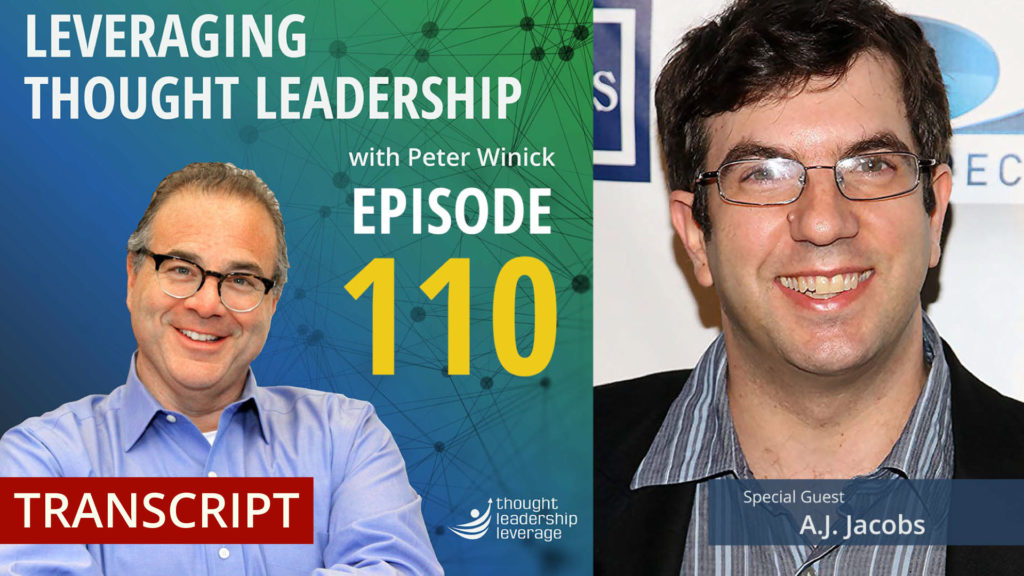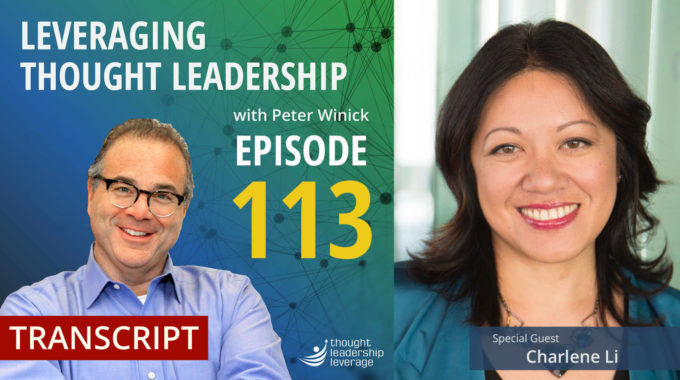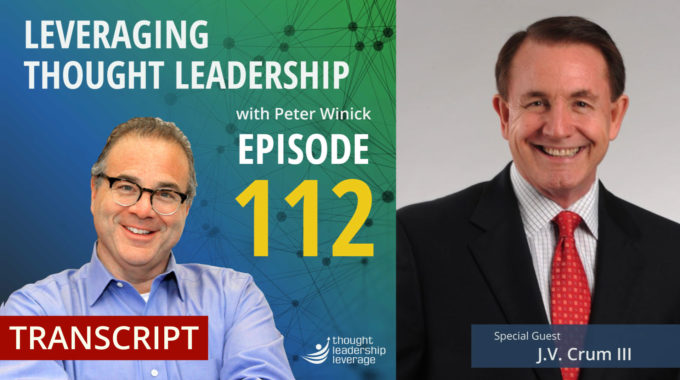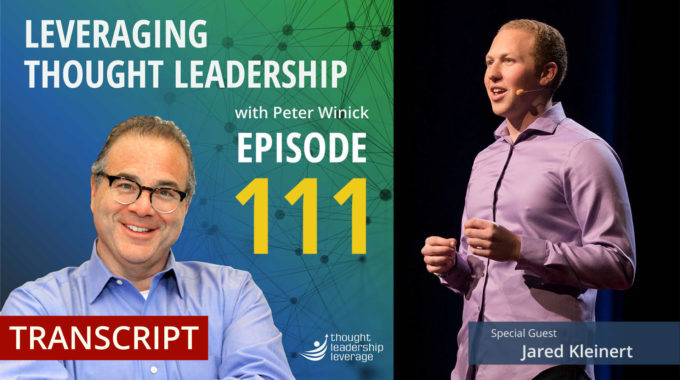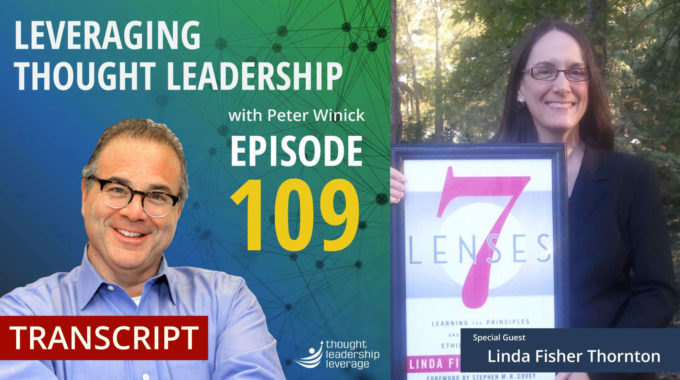Helping Your Thought Leadership Marketing Find Range, Reach, and Results. An interview with Charlene…
Process and Methodology in Thought Leadership Authorship | A.J. Jacobs
How to Create Thought Leadership Authorship with Real Appeal
An interview with A.J. Jacobs about thought leadership authorship, and how to create thought leadership content that appeals to future clients, as well as a wider audience.
We interviewed A.J. Jacobs, author, journalist, lecturer and human guinea pig. He has written four New York Times bestsellers that combine memoir, science, humor and a dash of self-help. He is also editor at large at Esquire magazine, a commentator on NPR and a columnist for Mental Floss magazine, and today we talk about content and thought leadership authorship!
Three Key Takeaways from the Interview:
- How to use process and methodology in your thought leadership authorship.
- What’s the key to creativity in creating thought leadership content?
- Why you should think about HR when you’re writing your thought leadership authorship.
Transcript:
Peter Welcome, welcome, welcome. I’m Peter Winick, I’m the founder and CEO of Thought Leadership Leverage, and you’re joining us on the podcast today, which is Leveraging Thought Leadership. Today, my guest is a really interesting guy, A.J. Jacobs. I’m sure you’ve heard of him. He’s an author, a journalist, a lecturer, and ultimately a human guinea pig. He’s written for New York Times best sellers. He’s given multiple TED talks and he subjects himself to these really amazing experiments, if you will. That becomes the basis of the book and the content and all that. He’s obviously been on Oprah, The Today Show. And luckily, The Colbert Report, Dr. Oz. And he has obviously lowered the threshold to agree to join us today. So welcome, A.J.
A.J. Jacobs Well, thank you, Peter, and an honor to be here.
Peter Well, I should say it’s a requisite that you’ve been on, at least Oprah and Dr. Oz before. I would even consider having someone on.
A.J. Jacobs So I think the heart of the farm team for getting.
Peter The opening act, if you will. So anyway, I’m really, really glad I was looking forward to this one today, because this is really interesting. You are quite different, right? The typical sort of model for authorship and thought leadership in the nonfiction space is stick to one thing and be that guy and continue to do it, do it, do it and just expand on it. You. That’s not you. Right. So tell me about sort of what your process or methodology is to decide to go do something and then how do you do it and then develop content, monetize it, live it and all that stuff.
A.J. Jacobs Sure. Well, I trying to find a topic that I’m passionate about assassinated with, and I dove in headfirst and trying to become an expert and sort of zero to 60 and in a year. So, I knew nothing about religion, but I decided to live by all the rules of the Bible for a year and see what happened. I knew I was in terrible shape. So, I decided to follow every piece of health advice I could and try all the diet and exercise and become the healthiest person alive. So, the method is the same, but the topics are different.
Peter So I got to ask one question. Are you now both biblical and healthy or then it goes away after a year?
A.J. Jacobs Well, I always keep certain things from the Bible book. You know, part of the Bible says that you have to grow a huge beard. So, I did save the beard and my wife made me. But there were things I kept from that, the sense of gratitude that wasn’t big in the Bible. And that actually was the topic of my most recent book. And from the health book. I mean, I no longer I am training for a triathlon, but I do like to I have a treadmill desk and I like to walk on my right. So, there are always things to take away.
Peter So I love that it’s driven by curiosity and passion. And then this is clearly the antithesis of theoretical. You’re the ultimate sort of applied guy, which is great because oftentimes we are exposed to things that are, you know, wonderful at the academic or conceptual level. But you wonder if any of these people have actually done any of the things that they test to be experts in. So let’s sort of Segway a little bit to sort of the business side of. So, you come up with an idea, let’s call it sort of a startup. How do you sort of decide which ones are worth investing in? Because you do want to take a you’re doing something bad or silly or not effective. So how do you let’s first decide don’t discuss sort of the idea selection process that you use tomorrow.
A.J. Jacobs Sure. And I think that’s a good thing to discuss, because I always tell people that I am pretty. I do come up with a lot of ideas right now. A lot. Right. But 99 percent of them are terrible. And I think maybe that’s a little worse than most evil. But I think that that is not an unreasonable ratio. I think the key to creativity is quantity, just generating tons of ideas. And some are going to stick, and some are going to fall by the wayside. Most by far, most are going to fall. So, I definitely will carve out fifteen minutes of my day just to brainstorm ideas. OK. Turn all computers, all iPhones, answer and generate ideas and then go back and see which ones are worth pursuing.
Peter But how do you do that, though? Because if like you said, if ninety nine out of 100 are just no good, eh, it sounds like what you’re saying is well you still need to generate does ninety-nine because you’ll get to the 100th. But how do you know when that 100th one is the one.
A.J. Jacobs Yeah. No, it’s a great question and it is the $64000 question. I have a few methods that I use. One is just if the idea is still in your mind a couple of weeks later then you know it’s got potential. I do a lot of testing on friends and even on Facebook. I’ll put an idea out there and see if it gets traction.
Peter All right. Let’s talk about that. So. You know, oftentimes and this I think is an amazing point because oftentimes people make the mistake, or I believe it’s a mistake at least to create isolation. They’ve got this great idea. And this man I’m going to, you know, go get the cabin up at the lake and I’m going to just dove in for four months and do this. And then they put the book out there and it’s a flop. But you’re doing beta testing in real time, saying, hey, let me put it out there and the world will tell me before I’ve invested a lot of time. Right. So, what tell me about that.
A.J. Jacobs I can give me a few examples. I mean, I try to test as much as I can. I test titles. OK, last book was about gratitude and the original title. Thank you all. But I thought that wasn’t catchy enough. So, I actually spent all four dollars of my own money to do a test on. I guess it was a mechanical Turk. OK. Yeah. On Amazon. And I put out I had the idea of thanks a thousand. OK. The book is, I think, a thousand people who helped make my cup of coffee. So, the logo designs are the right. You know, every real person. So, and I did that and tested it against. Thank you all. And sort of an a/b test. And thanks, a thousand one. And I was able to use that to go back to the publisher. Right. Actual hard data and say luck. Sure. This is what people prefer. And then they were more willing to switch because otherwise they might say, well, we are we’re experts here and we’ve done this for dozens of years. So that was one example.
Peter Being able to actually quantify what often comes into a, you know, in an opinion or, you know, choose your battles with your publisher or whatever. But if you can show them the data, it’s kind of hard to argue with that.
A.J. Jacobs Oh, yeah, I think I find it various and I have lots of friends who do it to cover with titles. But I also do it with the book itself. So, say I have 15 chapters. I will send it out to a group of 20 friends with the instruction. Can you please tell me which five chapters you like the most and which chapters you find the most boring? And then, Ali, I’ll do a sort of spreadsheet of what the reactions are. And if, you know, there are 10 people who say this chapter is boring, then I am probably going to cut that chapter.
Peter Well, and I like the way you frame that question because you could give the same stuff out to 20 people and say, give me your feedback. And that may imply just tell me good things, but you’re sort of setting the table saying, listen, tell me what’s good and tell me what’s boring, because I suspect some things, I do may be boring. Yeah, right.
A.J. Jacobs That when I say I say I known this too long and. Yes. And if you just say, can you give me your feedback then people I feel often get overwhelmed and they don’t give you anything or they just give you a pat answer. Yeah. Oh, it’s interesting. Also make it specific and this doesn’t have to be for books. This could be for anything. A presentation of power willing to sure. Speed. And I. I do that as much as I can. And I find it incredibly helpful. And so, the important thing to me is the group you have big you could give it to one person, and they could be an outlier. They shirty someone very specific tastes. And so, I don’t like to rely on just one person.
Peter What I would imagine by twenty, there’s some diversity in there. There’re different perspectives. There’s different whatever levels of education or different fields that they represent. So, you have a nice little microcosm there. So, this process is obviously work as you have it for New York Times best sellers. No. Yes, exactly. Okay. So, I want everybody to just pause and sort of reflect on anything that that a has said that you. Oh, no, no, no. I’ll do it my way. I mean, there’s something to be said for this process and methodology. And I would also add and push back, A.J., if you don’t agree, there’s a sense of open mindedness and humility and willing to be able to sort of pivot and go ups. Okay. Well, just because it was my idea. It stinks, right? Well, tell me about sort of what it what it takes to sort of do that. Because I think that that takes a lot of courage and a lot of people get caught up in their own ego.
A.J. Jacobs I love that you say that. And I do think. Yeah. Humility is important. Just because you came up with it doesn’t mean it’s brilliant. And certainly, in my case, it isn’t. I actually my first book was reading the Encyclopedia Britannica from A to Z. And I wrote a piece for Linked-In on five business lessons from the encyclopedia. And one of them was just what you said, be adaptable. Don’t be willing to pivot. Yep. They didn’t use that word back in the eighteen hundred, but. Thing is so crucial and there is so many historical examples. I mean, just one quickly was the Welch family that came up with right before prohibition and they came up with this non-alcoholic wine for churches, for non-alcoholic sacramental wine made of grape juice. And it was kind of a flop. But then one of them pivoted and said, hey, what if we try to sell it to kids as sort of this juice, this sweet juice instead of apple juice? And that’s when it took off. So then there were these lessons and pivoting.
Peter So that’s good to know. I want to talk a little bit or have you share with us your journey and your experience. The underlying business model. So, for you, there’s authorship there speaking. Talk to us about how you’ve figured that world out, because you’ve got a really interesting, quirky, very different way of putting content out. But now let’s talk about it. How do you make a living?
A.J. Jacobs Well, yeah, I make most of my living from two sources, which are my book contract and speaking.
Peter Well, let me just call a time out there. So, for most of you listening, I’m going to just state the obvious that AJ is an anomaly. Most people are not making their living from their book contracts in many instances. People are funding their book contracts be that self-published or even traditional today. So, you you’re able to because you’ve a track record of incredible success. I want to make sure that everybody realizes, you know, you don’t go out there with expectations of six figure advances.
A.J. Jacobs And I don’t expect that to continue because the business is changing somewhat. So i-, it is quite possible my advances will drop steeply in the future and I’m prepared for that.
Peter But if you have advances in speaking style, talk about sort of the relationship there and the speaking world and the publishing world. Yeah. Share with us anything you can that would be helpful.
A.J. Jacobs Sure. I mean speaking I love I I hated speaking in the beginning. I actually went into writing partly because I thought, oh, now I don’t have to be in public. And who is quite the. They used to get out there and sell. So, I forced myself to do it for so many years that I started to love it.
Peter And let me let me ask him that. So, I remember years and years ago, fifteen plus years ago, the first time I saw Malcolm Gladwell speak, he was awful. And then I was like I was really disappointed because I was just so in love with the first book. And then I’m like, well, of course he would be. Let’s think about what his life was like before. Introspective, maybe a little introverted, maybe not so social, whatever. And then I you know, luckily, I saw him a year or two later and he’s one of the best speakers I’ve seen. So, there’s a different skill set of sort of living in your head and putting words on paper. Then just sort of the antithesis of that is being. And ladies and gentlemen, here’s A.J. So, talk about that transition for you, because that’s not everybody can make that leap.
A.J. Jacobs Well, that is so true. And I didn’t know you as a band speaker that goes to figure. I think I think almost everyone is a bad speaker in the beginning. Forcing elves to do it and getting out there and trying to be as conversational. I find what resonates with audiences is being as conversational as possible. I also try to give them takeaways because you got to think about your audience, the audiences that I’ve spoken. I do see some corporate work. And I also, since I wrote a book about religion, I have spoken at many churches and synagogues and grazers. So there’s that. And colleges. And I always try to a mix of humor and practical takeaway. So, you know, sort of the fun, but also the useful. And that so far has served me well. Knock on wood. But another thing I had to teach myself was and I still have to remind myself, in fact, I’m doing it right now to remind myself to very everything I’m doing as much as possible. So, vary my pitch, OK? Vary the speed when I’m talking. So, talk quickly and then pause and then a medium and pause varying my tone of voice, vary my volume so lap. And that, I think, is so crucial to keeping people awake, because if you just latch on to what is new. So you’ve always got to be surprising them when you also want to sort of vacillate from a more cerebral to more narrative, you know, funny and sort of mix up that you don’t have to be stuck in one lane because that’s sort of.
Peter Yeah. That will put folks to sleep. So, talk about the business side of speaking. So how have you mastered that? Because a lot of folks that I work with. And a lot of folks want to speak, and I say speak, you know, professionally. Right. Right. Share with us sort of what your journey’s been life in terms of whether you’re working with the bureaus or booking direct and the type of speaking gigs you like and. What’s that like? Because it’s a very odd waters to navigate, if you will.
A.J. Jacobs Yeah. Now and I feel lucky that I that I’ve gotten opportunities in the beginning. I did it. My first book was about reading the encyclopedia and I did not get many speaking at all. So, it was only when it was the pitch that we would we would watch it.
Peter You would get up on the stage and pick up, you know, the letter V and just read from it or no one might have.
A.J. Jacobs Maybe that would have worked better. But that’s things I would debut that year and a half a reading by telling you the 10 best things.
Peter Right. Right.
A.J. Jacobs Yes. And it wasn’t hugely successful. I think the more practical. The book is, the more that it can have takeaways that corporations or fundraisers.
Peter Drill down on that. So, what might you know? So, let’s say I’ve got content out there. Does it really matter what the domain is? What are the. And this is, I think, the interesting bridge here. So, I’ve got my content. The market that has their needs. How do I bridge it? What do companies want? What do they want to take away from a keynote that last maybe an hour or so?
A.J. Jacobs Well, in my experience, it’s that combination of entertaining or does they got to be entertained. But also, they want that those three or four takeaways that that’ll make them their workers more productive or happier or healthier. So, I’ve done health talks like Goldman Sachs. I did one on like how to stay healthy. And I guess from a purely cost benefit analysis, you want to be alive and making money. And I spoke a lot. I’m doing a talk to a bunch of CEOs about gratitude. And I’m going to try to frame it about sort of the benefits of gratitude, not just to your mental health, but again, to the workplace. You know, you’re happier and we’re grateful. Workplace is going to be more productive.
Peter So you have to extrapolate actually from there. There’s a plethora of information why gratitude is beneficial to me as an individual. But you have to sort of expand the conversation, too. And here’s what a team that practices gratitude looks like. And here’s what an organization that’s more embracing of a grateful mindset. And what that looks like in terms of outcomes are how they serve their clients. Right. Is that what you’re saying?
A.J. Jacobs Exactly. My book was about going around the world thanking a thousand people so I can tell some tales of that and some funny stories. But also, I looked and found data on how gratitude helps in business and found some case studies of companies where they wrote handwritten thank you notes to their customers and saw like double the retention rate.
Peter So – So I think that’s key because oftentimes I’ve seen early stage keen odors where it’s only one or the other. Right. So, if they’re an academic, it might be data point, data point, data point, data point. If there are more, let’s say, motivational for lack of a better word, it’s story, story, story. So how do you. It sounds like you’ve got a nice blend of your data point and a story that illustrates it or the other way around and why that’s really way more powerful than sticking to sort of one of those.
A.J. Jacobs Oh, yeah, I think you need both. I think you’ve got to keep people interested with the personal story and the traditional things. People like inspiration, goal and vulnerability and humor and things of that nature. But then you want to drive it home with a little science. So. So, yeah, a combination of both is key. And of course, starting I think with the core for a good start, you know. Want to start with the data.
Peter Well how do you how do you get to relatable? Because, you know, if nothing else, your extreme. Right. So, I mean that in a good way. Right. So, most people might say, you know, I’m feeling like a chunky monkey. I get to lose 20 pounds. So, here’s the thing I’m going to do not spend a year of their lives, you know, becoming best in class or religion or whatever. So how do you. Because I think most people look at what you do and go, oh, that’s really interesting, but I’m not doing that for a year. How do you how do you sort of connect the extreme to the relatable?
A.J. Jacobs Well, my at least for me, it’s that I am just a regular sort of I’m the Stand-In for the regular American. And I was not in good shape to begin with. So, I’m they can follow my journey. And so, I kind of become in really good shape. And of course, they’re never going to do all the things I did because, you know, it’s my full-time job.
Peter Right.
A.J. Jacobs But I can at the end of the books, I’m able to have, you know, here are ten things that you can do to make your life better. Sort of the takeaways you got.
Peter Because I’ve tried a hundred or a thousand things. I can give you the 10. So, it’s sort of a time saver or a best practices or is that cool? Any anything else for folks you’ve sort of embarking on the speaking side that you would advise or recommend?
A.J. Jacobs Well, I would say when you are writing a book, if you write a book, then definitely think of the audience that you are, you know, think ahead to what a corporation or a college or an organization find useful in this book and maybe tailor your book a little towards that.
Peter Yeah, that’s a great point, because even those markets, when you think about the speaking market, you know, the college market is very different than the traditional corporate market is very different than the association market. So, you don’t have to necessarily design exclusively for one. But if you understand the buy side. And I think, you know, underneath the buy side, I think people earlier in their speaking careers get confused from the button to seat the audience member, making them really, really happy and not really considering. Wait a minute. There’s. The audience. But there’s a whole other constituent of the buyer. The purchaser, right, the person that owns that meeting and what their expectations are. It’s not that they’re a thousand percent different from the audience member in the seat. But they’re not identical. Could you just touch on that for a moment?
A.J. Jacobs Oh, yeah. I think that’s a great point. I mean, I think that the people who are going to be booking you are not the audience. It’s going to be the H.R. person or the events person at the corporation. So, yeah, think of think of them when you are when you’re writing or not, even when you’re writing, role in your crafting your message after you write. So in your well, when you’re writing LinkedIn articles, maybe write a LinkedIn article that could just be turned into a speech, you know, something like the 10 best business that I have given a couple of talks on that and best business lessons from the Encyclopedia Britannica and my LinkedIn article.
Peter Well, this this has been awesome. I could talk for hours. But given that we’re running short on time here, I really appreciate all that you’ve shared with us in terms of the ideation piece and how you refine your ideas and how you put them out there as we sort of wrap up at any nugget or two that you’d throw out at an inspiring thought leader or author that’s ready to dove in deeper in terms of what to do or not to do.
A.J. Jacobs Well, just to repeat that, you know, some people are good at coming up with ideas in the shower or while they’re walking. And occasionally that happens to me. But often for me, I have to really sort of make an appointment with my creative side and just really block off a time to come up with ideas and give myself license to know that most of them are not going to make it right. So really being very disciplined. It’s a little bit of paradoxical but being very disciplined in your creativity.
Peter Got it. Well, thank you so much for joining us. And this is been chock full of really valuable information. Thank you so much, A.J.
A.J. Jacobs Thank you, Peter.
To make content successful it has to be memorable. Peter shares some tips for making your “Content Sticky”.
